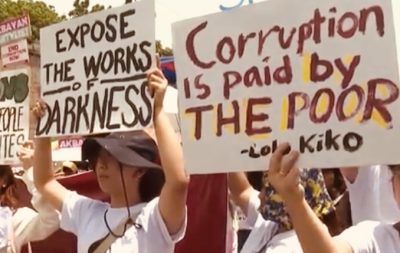Philippines Hit by Protests (Corruption and Political Cronyism)
Kanako Mita, Michiyo Tanabe, and Lee Jay Walker
Modern Tokyo Times

President Ferdinand Marcos Jr. of the Philippines publicly acknowledged the scale of the flood-control corruption scandal in a national address. His admission only fueled public outrage, as the full extent of the deception came to light — sparking a wave of anger now culminating in large-scale protests across Manila.
The demonstrations have drawn participants from across the political spectrum — including Christian organizations, student groups, labor unions, socialists, and others — all united in outrage. The unrest intensified following revelations that key flood relief projects were fraudulent, serving only to enrich corrupt officials and bureaucrats rather than aid communities in need.
The Guardian reports, “Estimates by the Philippine government suggest that the country’s economy may have lost as much as £1.48bn over the last two years from corruption in flood control projects. Greenpeace has estimated the cost is even greater, saying more than £13bn was siphoned off from climate-related projects in 2023.”
Marcos Jr. is distancing himself from the corrupt elites.
He said, “Do you blame them for going out on the streets?” he asked reporters at a press conference this week. “If I weren’t president, I might be out in the streets with them.”
Marcos Jr. continued, “Of course, they are enraged. They are angry, I’m angry. We should all be angry, because what is happening is not right.”
Ironically, President Marcos’s father — the late Ferdinand Marcos, who ruled the Philippines for over a decade — was himself accused of plundering an estimated $10 billion during his time in power.
In a nation plagued by widespread poverty, political elites, local officials, and crony business leaders continue to enrich themselves — even as devastating floods and typhoons claim lives and destroy communities. Their actions reflect a disturbing disregard for the welfare of ordinary Filipinos, prioritizing personal gain over the country’s development and resilience in the face of recurring natural disasters.
Cardinal Pablo Virgilio David (the head of the Catholic Bishops’ Conference) said, “Our purpose is not to destabilise but to strengthen our democracy.”
Naturally, while protests in Indonesia, Nepal, and the Philippines — and across Kenya and other African nations — differ in context, they share a common thread: deep-rooted political corruption, cronyism, collusion between business elites and the political class to siphon public funds, and a widespread sense of hopelessness among ordinary citizens.
Time Magazine reports, “The flood-control corruption scandal is a double-whammy for the Philippines. It is among the most vulnerable nations to the climate crisis: floods are a recurring deadly problem in the country, and successive governments have claimed to dedicate their efforts to mitigating the effects of such natural disasters. But corruption is similarly rampant: the Philippines lags behind many of its Asian neighbors, according to Transparency International’s Corruption Perceptions Index.”
Lee Jay Walker (Modern Tokyo Times analyst) says, “Democracy is supposed to rise above family dynasties, one-party states, authoritarian regimes, and Islamist Sharia governance. Yet, across democratic nations, mass protests are increasingly common—driven by rampant corruption, political elites prioritizing war or unpopular policies, and ordinary people grappling with rising living costs and a profound sense of abandonment.”
The people of the Philippines — like those in France, Indonesia, Kenya, Nepal, Pakistan, South Sudan, the United Kingdom, and beyond — deserve political representatives who genuinely care about ordinary citizens, not grandiose projects and war mongering (France, Germany, and the United Kingdom) or the mass misappropriation of public funds that line the pockets of the political elite, local officials, and corrupt business leaders entrenched in the system.

Modern Tokyo News is part of the Modern Tokyo Times group
http://moderntokyotimes.com Modern Tokyo Times – International News and Japan News
http://sawakoart.com – Sawako Utsumi’s website and Modern Tokyo Times artist
https://moderntokyonews.com Modern Tokyo News – Tokyo News and International News
PLEASE JOIN ON TWITTER
https://twitter.com/MTT_News Modern Tokyo Times
PLEASE JOIN ON FACEBOOK